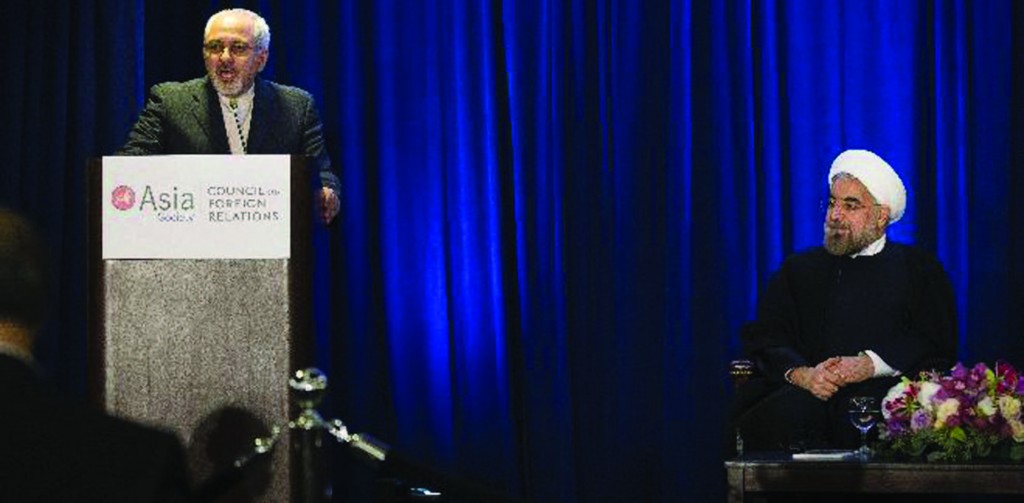GENEVA (TIP): A new round of Iran nuclear talks began in fits and starts November 10, with the two sides ending a first session just minutes after it began amid warnings from Iran’s supreme leader of “red lines” beyond which his country will not compromise. Still, both sides indicated a first-step agreement was possible on a deal to roll back Iran’s nuclear program in exchange for limited sanctions relief, despite strong opposition from Israel and unease in both Congress and among Iranian hard-liners. President Barack Obama appears determined to reach such an agreement, which could be a major step toward reconciliation between the United States and a former ally that turned adversary after the Islamic Revolution of 1979. But America’s longtime allies Israel and Saudi Arabia fear a deal will fall short of ending the Iranian threat and that a resurgent Iran will transform the balance of power in the Middle East.
A senior US official said Wednesday’s brief plenary was only a formality and that bilateral meetings would continue through the evening to try to hammer out the first steps of a deal. She demanded anonymity under US government briefing rules. However, there was also tough talk, reflecting tensions from nearly a decade of negotiations that have begun to make headway only recently. While voicing support for the talks, Iran’s supreme leader, Ayatollah Ali Khamenei, insisted there are limits to the concessions Tehran will make.
And he blasted Israel as “the rabid dog of the region” comments rejected by French President Francois Hollande as “unacceptable.” French spokeswoman Najat Vallaud-Belkacem told reporters in Paris that such statements complicate the talks, but France still hopes for a deal and its position has not changed. At the previous round earlier this month, France said it wanted tough conditions in any preliminary deal with Iran, and those negotiations then ended with both sides speaking of progress but continued differences on a final agreement. Khamenei gave no further details in a speech to a paramilitary group aimed at both placating hard-liners and showing his backing for the Iranian officials meeting with international negotiators in Geneva.
But his mention of Iran’s “nuclear rights” was widely interpreted as a reference to uranium enrichment. For his part, Israeli Prime Minister Benjamin Netanyahu pushed ahead with criticism of what he asserts is a deal in the making that will give Iran too much for too little in return. Netanyahu, in Moscow to meet with President Vladimir Putin, renewed his demand for a full stop to all Iranian nuclear programs that could be turned from peaceful uses to making weapons. He said that Israel wants to see a negotiated settlement, but added that it must be “genuine and real.” “Israel believes that the international community must unequivocally ensure the fulfillment of the UN security council’s decisions so that uranium enrichment ends, centrifuges are dismantled, enriched material is taken out of Iran and the reactor in Arak is dismantled,” Netanyahu said, referring to Iran’s plutonium reactor under construction. Putin had no public reaction to Netanyahu’s comments.
“We expect that mutually acceptable solutions will be found shortly,” he told reporters. If the talks produce a deal to freeze Iran’s nuclear efforts, negotiators will pursue a more comprehensive agreement that would ensure that Tehran’s program is solely for civilian purposes. Iran would get some sanctions relief under such a first-step deal, without any easing of the harshest measures, those crippling its ability to sell oil, its main revenue maker. Iran has suggested it could curb its highest-known level of enrichment, at 20%, in a possible deal that could ease the US-led economic sanctions. But Iranian leaders have made clear that their country will not consider giving up its ability to make nuclear fuel, the centerpiece of the talks since the same process used to make reactor stock can be used to make weapons-grade material.
Details of sanctions relief being discussed have not been revealed. But a member of Congress and legislative aides on Wednesday put the figure at $6 billion to $10 billion, based on what they said were estimates from the US administration. The aides and the member of Congress demanded anonymity because they weren’t authorized to divulge the estimate publicly.The senior US administration official declined comment beyond saying that envisaged sanctions would give Iran only limited relief and they could be rolled back if Iran reneges on terms of any initial deal.
“We will not allow this agreement, should it be reached … to buy time or to allow for the acceptance of an agreement that does not properly address our core, fundamental concerns,” Secretary of state John Kerry told reporters in Washington The talks are being convened by Catherine Ashton, the European Union’s top diplomat. Her spokesman, Michael Man, said there is “room for flexibility” on sanctions relief if Iran’s concessions warrant it. In Washington, department spokeswoman Jen Psaki expressed optimism, saying the Obama administration believes “we have an opportunity to move forward on a diplomatic path with the Iranians.”
